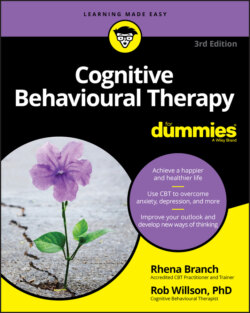Читать книгу Cognitive Behavioural Therapy For Dummies - Rob Willson - Страница 34
Disqualifying the Positive: Keeping the Baby and Throwing Out the Bathwater
ОглавлениеDisqualifying the positive (see Figure 2-10) is related to the biased way that people can process information. Disqualifying the positive is a mental response to a positive event that transforms it into a neutral or negative event.
© John Wiley & Sons, Inc.
FIGURE 2-10: Disqualifying the positive.
The following are examples of disqualifying the positive:
You convince yourself that you’re worthless and unlovable. You respond to a work promotion by thinking, ‘This doesn’t count, because anyone could get this sort of thing.’ The result: Instead of feeling pleased, you feel quite disappointed.
You think you’re pathetic and feel low. A friend tells you you’re a very good friend, but you disqualify this in your mind by thinking, ‘She’s only saying that because she feels sorry for me. I really am pathetic.’
Hone your skills for accepting compliments and acknowledging your good points. You can try the following strategies to improve your skills:
Become aware of your responses to positive ‘data’. Practise acknowledging and accepting positive feedback and acknowledging good points about yourself, others and the world. For example, you could override your workplace disappointment by recognising that you’re the one who got the promotion. You can even consider that the promotion may well have been a result of your hard work.
Practise accepting a compliment graciously with a simple thank you. Rejecting a sincerely delivered compliment is rather like turning down a gift. Steer your thinking towards taking in positive experiences. When others point out attributes you have, start deliberately making a note of those good points. Even if your current thinking bias leads you to doubt the validity of a compliment or good experience, try considering that you may well be wrong to do so. Trust what others say for a change!
If you frequently disqualify or distort your positive attributes or experiences, you can easily sustain a negative belief, even in the face of overwhelming positive evidence.
